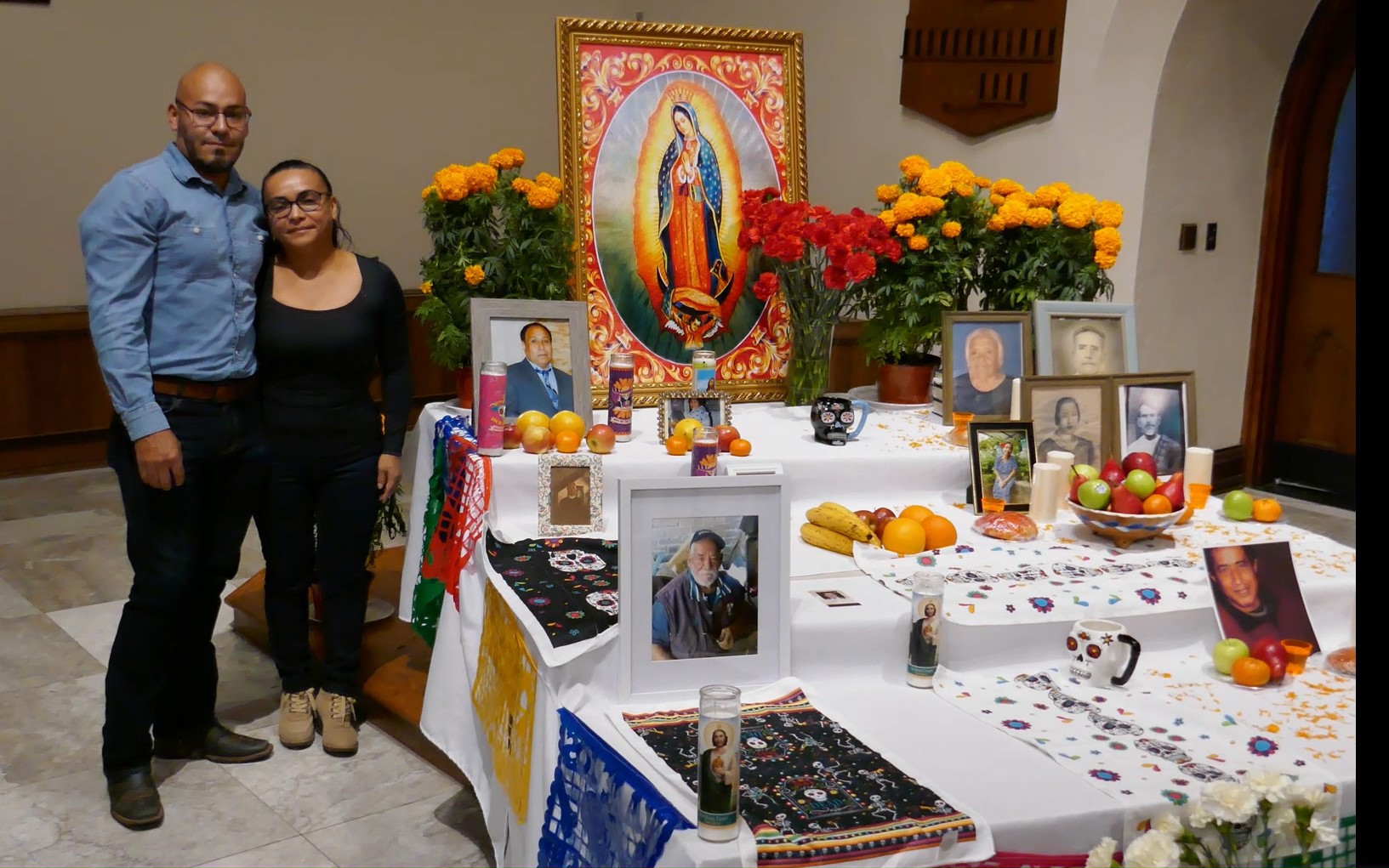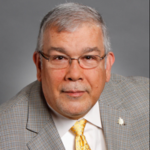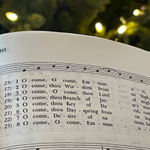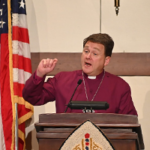Las Posadas:
The Road to Bethlehem
by Michael Redmond
“Joseph also went from the town of Nazareth in Galilee to Judea, to the city of David called Bethlehem … He went to be registered with Mary, to whom he was engaged and who was expecting a child. While they were there, the time came for her to deliver her child. And she gave birth to her firstborn son and wrapped him in bands of cloth and laid him in a manger, because there was no place in the guest room.” ~ Luke 2:4–7 (NRSV)
As the crow flies, the distance between present day Nazareth and Bethlehem is about 70 miles. That doesn’t seem all that far to us today in our world of automobiles and highways. But imagine that a young couple had to make that trip on foot, the woman being pregnant and close to term, riding a donkey, according to tradition. Imagine, too, that you could not make that trip as the crow flies; instead, you had to detour around an unfriendly region (Samaria) to reach your destination. The trip could take you a week at least. Along the way you would have had to find food and shelter, day after day.
The road to Bethlehem is the theme of Las Posadas, a Mexican Advent tradition for more than 400 years, widely celebrated throughout Latin America and the U.S. Southwest and as far away as the Philippines. It is a nine-day journey alongside Mary and Joseph, stopping with them night after night as they seek and find a posada, a lodging, a place to stay. This novena (a nine-day course of devotional prayer) will be celebrated yet again by the Spanish-speaking community within Wilmington’s Trinity Episcopal Parish, beginning December 16 and culminating in the last posada, in Bethlehem, on Christmas Eve.

According to Angelica Morales of New Castle, president of Trinity’s Junta Parroquial (Latino committee), the community’s celebration has been adapted to different circumstances while retaining its identity. It remains a mixture of prayer, fellowship, scripture, song, and feast.
Morales, who grew up in the state of Guerrero on Mexico’s west coast, remembers the traditional outdoor processions in her town, often involving hundreds of candle-bearing participants, going from house to house over the course of Las Posadas. But outdoor processions are simply not practical during “the hard winter” in Delaware, she said, so Posada nights are hosted indoors, in parishioners’ homes or Trinity Church.
The tradition of Las Posadas descends from the Bible plays and pageants that were popular teaching vehicles in medieval Europe. Stories from scripture would be acted out by parishioners and enlivened with songs and features of the local culture. Spanish missionaries used such plays to teach the Christian faith to the indigenous Mexican population.
In 1586 Friar Diego de Soria wrote from Mexico City to Pope Sixtus V, who authorized a special Christmas novena to be observed throughout Mexico on the nine days preceding Christmas. The nine days are said to represent the nine months of Mary’s pregnancy and the nine virtues Mary and Joseph exemplify ─ generosity, humility, charity, courage, holy detachment, purity, justice, joy, and trust. Las Posadas is observed today not only by Roman Catholics, but by Latino Protestants as well.
Trinity Parish’s Spanish-speaking congregants look forward eagerly to Las Posadas, Morales said, as part of a cluster of special celebrations at year’s end. These include El Dia de los Muertos (The Day of the Dead) in November; celebrating All Saints and All Souls; the feast day of Our Lady of Guadalupe on December 12, and Tres Reyes (Three Kings, i.e., Epiphany) in January. The Episcopal Church has provided for these celebrations in The Book of Occasional Services 2022.
While subject to local customs and adaptations, Las Posadas follows a traditional pattern. The congregants, in procession, follow parishioners playing the roles of Mary and Joseph (los peregrinos, the pilgrims) as they go from “inn” to inn, pleading for hospitality. At first the plea is rebuffed by the innkeepers (los posaderos) in a traditional two-part song, Pedir Posada. Eventually the innkeepers recognize Mary and Joseph as santos pelegrinos (holy pilgrims) and take them in.
In Mexico and other Latin American countries, Mary may arrive riding a real donkey, with angels and shepherds joining the procession along the way, and children carrying poinsettias. The procession is followed by musicians, with the entire company singing festive villancicos (carols).
The celebration then continues indoors with prayer and a litany, the reading of scripture, and a party featuring the breaking of a seven-pointed piñata, filled with candies. The breaking of the star symbolizes Christ’s breaking the power of the seven deadly sins (pride, greed, wrath, envy, lust, gluttony and sloth); the candies symbolize Christ’s sweet gifts of grace.
Then comes the feast. Traditional fare includes tamales (steamed corn dough filled with meats, cheeses, and vegetables), pozole (hominy stew, with pork and peppers) and ponche navideño (hot fruit punch). It’s customary for everybody to receive a bolo, a small bag of candy, to take home.
“We would love for everybody to be part of Las Posadas. That would be wonderful. Bring food,” said Angelica Morales, with a smile.
The order of service that Trinity uses each night of Las Posadas includes this prayer: “Sabemos que esta noche hay en el mundo hombres, mujeres, niñas y niños viajando agotados por caminos peligrosos, en busca de un mesón. Te rogamos que las puertas se les abran” In English: “We know that tonight around the world there are men, women, girls and boys, traveling exhausted along dangerous roads, in search of shelter. We pray that the doors be opened to them.”
Thus the ancient story of Mary and Joseph on the road has a powerful resonance with critical issues today. “I came to the United States as a teenager with no papers,” Morales said. “I came with the clothes on my back and a plastic bag of belongings, that’s all. I am a citizen now, but I came undocumented.” Morales today is a wife, a mother, a home owner, and a business owner, embracing both her citizenship and her heritage.
According to DATA USA’s figures for 2021, 9.7 percent of Delaware’s population is Hispanic, with “the most common birthplace for foreign-born residents of Delaware (being) Mexico, the natal country of 14,392 Delaware residents.”
For more than 30 years, Trinity Parish has been providing Sunday Eucharist in Spanish and special events such as first communions, weddings, funerals, quinceañeras (birthdays), and baby namings. The parish provides pastoral support to the Latino congregation and members of the wider communities through the ministry of the Rev. Patricia S. Downing, Trinity’s rector, and the Rev. Dr. Marta Illueca, associate rector. The entire parish comes together several times a year for bilingual worship.
“We continue to address the ever-changing needs of the Latino community in our area: social, education, and legal. We strive to be a strong voice in the community for equality, justice, and economic opportunity,” Downing said.
Trinity’s Junta Parroquial includes Trinidad Carranza; Alberto Carranza; Sergio Carranza; Carlos Dominguez; Ana Martinez; Angelica Morales, and Gerardo Plasencia, plus the rector and associate rector. An important role in the community’s worship is played by musicians Ivan Martinez and Alberto Martinez. The junta represents the 80 families on the parish’s census. In collaboration with Trinity’s clergy and vestry, the junta deals with community issues and organizes community events.
The celebration of Las Posadas is open to all. For locations and other information, call the Trinity Parish office at 302.652.8605 or write to office@trinityparishde.org. The celebration culminates on Christmas Eve at 8:00 p.m. with Posada y Eucaristia Nochebuena at Trinity Church, 1108 N. Adam Street, Wilmington.
On the Web:
Pedir posada https://www.youtube.com/watch?v=D6nwzpI-6UE

A versatile editor and writer with an extensive background in daily journalism, Michael Redmond, is a regular contributor to the Delaware Communion and a member of the diocesan communications team.
mr@michaelredmond.net





